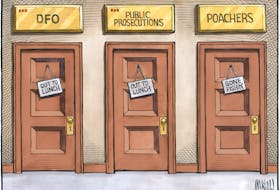
The cardholder sees it as an opportunity to bank points that may one day lead to a dream vacation. All Geddes sees is processing fees.
“With all the ones that have points associated with them, we have to pay more to put that transaction through than if somebody used cash or debit,” says Geddes, owner of used book store Readers’ Haven in Windsor and chairperson of the Windsor Business Enhancement Society.
The merchant loses a percentage of the sale to fees every time a customer swipes a credit card in pursuit of points.
Geddes says merchants selling more expensive items than used books take a bigger hit, but it’s still something that impacts her bottom line.
“It’s a catch 22, people will spend more money if you have the machine so you just have to have safeguards in place.”
For some merchants, this means only accepting cash or debit for small purchases.
“It gets to the point where you just can’t keep sucking up every last dime because it just hurts the bottom line too much,” says Geddes.
However, accepting plastic has its advantages too.
In fact, Geddes doubts she would ever try to run her store as a “cash only” business. She finds most customers view debit and credit as convenient forms of payment, and they even tend to buy more at once than the cash-carrying crowds.
“In this day and age I think it’s very hard to go without it, so you just have to add that into your bottom line.”
A necessary evil. That’s the way Stellarton business owner Blair Hodges feels about cashless transactions.
“There’s a high percentage of people that come in that don’t even have $20 on them,” he says. “If you didn’t offer that service, they just wouldn’t shop at your store.”
The longtime owner of Scotia Vacuum and Toys, Hodges has never been afraid of technology. He had a computer in his shop as soon as they came on the market. He was also quick to adopt the point of sale device into his store in Stellarton.
“Ever since it’s been available.”
In an ideal world, he’d prefer to see people pay with cash, but he’s come to accept fees as just part of the job.
“The banks charge fees on everything,” says Hodges. “They even charge fees on depositing cash in the bank.”
It amounts to hundreds of dollars a month and, for small businesses, that can significantly impact the bottom line.
But not all card payment system options are equal for small businesses.
“The big question is do you rent the one from the bank and know that everything is going to be good service, work properly and pay extra, or do you try to find one of those smaller guys out there that’s offering lower rates and hope the machine doesn’t break.”
Hodges has personally chosen to go with one from the bank.
He says there are different rates charged for different cards. A debit card is charged per use, while the credit cards are typically a percentage.
“If someone comes in and has a card with a chip, you’re in one category. If the card doesn’t work or doesn’t have a chip and you have to swipe it, you have to pay a little extra because it’s a liability.”
Hodges says it’s discouraging that a card that provides higher miles or points also costs retailers more.
“It’s kind of a sore spot, but what can you do?”
Donnie Hamilton says he sometimes feels like a dinosaur when he’s in the checkout line. He’s one of those people who still uses actual money to pay for his purchases.
“I’ll pull out $20 to pay for something,” he says. “Everyone ahead of me is putting their PIN numbers in.”
But that’s Donnie Hamilton the consumer talking. As a retail merchant in downtown Yarmouth, Hamilton recognizes that it’s really what the customer wants that “rules” and, these days, that involves accepting payment by debit and credit cards.
Hamilton – owner of Hamilton’s Fine Clothing and Runner’s Attic on Main Street – figures 80 per cent or more of his business transactions are done with cards. Which card is used more, he says, can depend on the economy.
“For instance, as lobster season gets underway and there’s more money around, then I start to see more debit cards. The cash is in their bank account.”
Whether the shift to cards is an entirely good thing, Hamilton isn’t sure, but he says it doesn’t matter because this is the reality of retail today.
While accepting payment by card costs the retailer, he says it is a small price to pay. Like virtually anything else, there probably are pros and cons, says Hamilton, but he likens it to the tide coming in… it’s just something you have to work with.
Linda Deveau, manager of the Yarmouth Mall, takes a similar view, saying “It’s not better, it’s not worse, it’s just different.”
A former retailer herself, Deveau notes that the move from cash to plastic has been a gradual evolution and that this is what the younger generation has grown up with.
“Certainly, paying electronically is the way of the world,” she says. “I love it when the power goes out and you have to dig through your cupboards to find your slider machine. When you pull that out of the box, the young students working for you will look at it and say ‘what is that?’ So yeah, it’s just the electronic age upon us.”
Hamilton says when he started out in the retail business in the late 1970s – a time when paying with cash was the norm – he never would have imagined the shift that was to happen over the next few decades.
“You can’t stop it. You can’t change it. So you go with it.”
Hamilton says he sees the day coming when paying for goods and services with good, old-fashioned bills will have something in common with the dinosaurs: both will be a thing of the past.
By TC Media contributors:
Ashley Thompson, The Hants Journal
Adam MacInnis, The New Glasgow News
Eric Bourque, The Yarmouth County Vanguard
Editor’s Note: This article appeared in the Nova Scotia Business Journal. Check out more related stories in the magazine.








